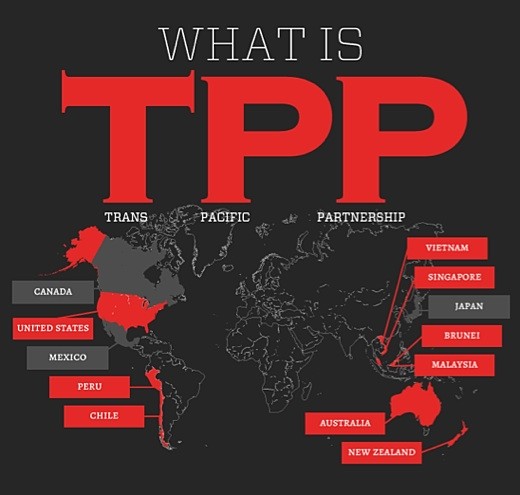
Historically, the TPP is an expansion of the Trans-Pacific Strategic Economic Partnership Agreement (TPSEP or P4), which was signed by Brunei, Chile, New Zealand, and Singapore in 2005. Beginning in 2008, additional countries joined the discussion for a broader agreement: Australia, Canada, Japan, Malaysia, Mexico, Peru, the United States, and Vietnam, bringing the total number of participating countries in the negotiations to twelve.
The Trans Pacific Partnership (TPP) agreement has been released to the public. With international anger on high alert; it has been condemned as an attack on worker’s rights, the environment, public health, small businesses and startup companies. By far the most important effects of the TPPA relate to the impact it is designed to have on the internet.
If signed by all twelve countries involved TPP will become a legally binding contract, It is not a trade deal. The contract has 30 chapters and 6,194 pages covering range of questions that have little to do with tariffs, imports or indeed exports.
The document presents a huge drive to expand copyright enforcement, which will ultimately lead to the criminalisation of common online activities allowing to the main thrust of the contract which gives the corporate state the means to infringe your freedom of expression. This will be achieved through internet censorship should your video, report or story, utilise the work of another. Think carefully about your choice of soundtrack to your home made videos.
It is easy to see how it is intended to be used for censorship when you study the chapter on intellectual property rights which aims to en-mass, stifle the contract signatories through the removal of the fair use provisions that are necessary to protect freedom of speech.
TPP member countries must enforce copyright terms 70 years after the death of the creator, keeping huge amounts of information locked away from the public domain, in turn this will facilitate the right for corporate governments to use copyright laws to censor content at its discretion.
The mechanism by which they can act without recourse is to require of the service providers to police the system and ensure they have in place a structure to immediately remove from the internet content upon a copyright holder’s request, without any visit to the courts for a court order. The service providers have to enforce the rules rigorously or face huge sanctions and fines
In the trade secrets protocols they aim to frighten whistleblowers and journalists by handing out severe penalties for anyone accessing or exposing corporate secrets. I wonder, was the phone hacking ‘black op’ the foreword to this kind of garbage….?
The intellectual property chapter has with it a provision that includes intellectual property enforcement which uses what they call the Investor State Dispute Settlement scheme(ISDS). The scheme allows corporations to sue governments in secret international tribunals if they suspect that a nation’s sovereign laws are limiting the ability to make profit.
Potential members
South Korea was not part of the 2006 agreement, but showed interest in entering the TPP, and in December 2010 was invited to the TPP negotiating rounds by the US after the successful conclusion of its Free trade agreement between the United States of America and the Republic of Korea. South Korea already had bilateral trade agreements with some TPP members, but areas such as vehicle manufacturing and agriculture still needed to be agreed upon, making further multilateral TPP negotiations somewhat complicated. South Korea may join the TPP as part of a second wave of expansion for the trade agreement.
Other countries interested in TPP membership as of 2010 included Taiwan, the Philippines, Colombia,Thailand, Laos as of 2012, Indonesia as of 2013. According to law professor Edmund Sim in 2013, many of these countries needed to change their protectionist trade policies in order to join the TPP. As of 2013, potential future members included Cambodia, Bangladesh and India.
The most notable country in the Pacific Rim not involved in the negotiations is China. According to the Brookings Institution in 2013, the most fundamental challenge for the TPP project regarding China was that “it may not constitute a powerful enough enticement to propel China to sign on to these new standards on trade and investment. China so far has reacted by accelerating its own trade initiatives in Asia.” In 2013 it was thought that China might still be interested in joining the TPP eventually.
Further Study
TPP trade deal published online
Intel -based Core vPro totally and permanently hackable